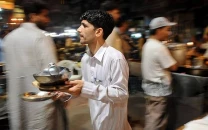Eat to beat diabetes
There are always substitutes for everything in life. One just has to learn to prioritise and make the right choices.

Eat to beat diabetes
Unfortunately, not everyone has the same genetic make up to cope with lifelong sugar storage. If one falls in that group, one needs to be cautious at all times. By the time a person reaches their 40's or 50's, the insulin receptors in the body go on strike and stop receiving any more sugar deliveries. As a result, there is excess sugar in the bloodstream. The main question is that if one has already been diagnosed with diabetes, what should their diet plan be?
According to Dr Fatema Jawad, consultant diabetologist at Sindh Institute of Urology and Transplantation (SIUT), diet is an integral part of one’s life, apart from the medication controlling blood sugar in both type 1 and type 2 diabetic patients. The basic diet principles in both the types are more or less the same. “Type 1 diabetic patients are insulin dependent. It occurs because the immune system attacks and kills the cells of the pancreas, the organ that produces the hormone insulin, which ushers blood sugar out of the bloodstream and into the cells of the body. Type 1 diabetic patients should avoid sugar completely and their regular diet should compose of 60 per cent carbohydrates and the remaining 40 per cent from mono saturated fats and protein,” she said. As for type 2 diabetes (non-insulin dependent), which mostly occurs in middle age due to obesity, she suggested, “people with type 2 diabetes should cut down their fat intake to control weight gain, which in turn helps in controlling blood sugar.” For both types, patients should add whole grain wheat and bread to their diet. Fruits such as apple or pears should not be peeled and rather, consumed whole. “Forty gms of fibre intake daily is a must because it stabilises blood sugar,” she added. Traditional beliefs recommend the consumption of karela, jaman and kalonji. In our society these remedies are followed from generations. Exercise is insulin’s best friend and lends a helping hand, moving sugar out of blood stream and into the cells.
According to Amjad Hussaini who is in his 70's, “I have been a diabetic patient for almost 20 years now and I believe that there is a very easy way of following your diet even with the disease. Life doesn’t end at sugar!” He suggested that the patient should add whole foods, such as fruits, vegetables, grains, beans, nuts and seeds to their diet. “According to my research as a patient, these foods are rich in fibre and other nutritional factors that help stabilise blood sugar,” he adds.
He also recommends that patients, “Avoid the use of artificial sweeteners which contains aspartame as it is hazardous to our health. Patients should cut down on sugar consumption completely,” he says.
“One of my doctors suggested that I take supplements that have fatty acids, which helps repair the damage caused by a lifetime of consuming too much sugar,” said Rehana Azeem, another victim of type 2 blood sugar.
There are always substitutes for everything in life. One just has to learn to prioritise and make the right choices.
Published in The Express Tribune, November 14th, 2010.



















COMMENTS
Comments are moderated and generally will be posted if they are on-topic and not abusive.
For more information, please see our Comments FAQ